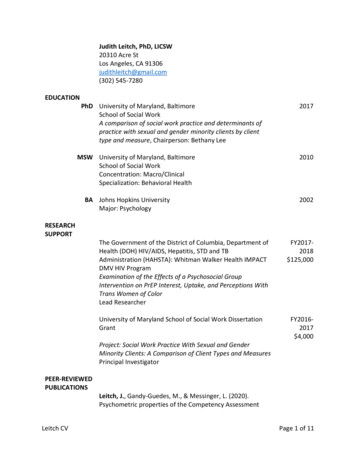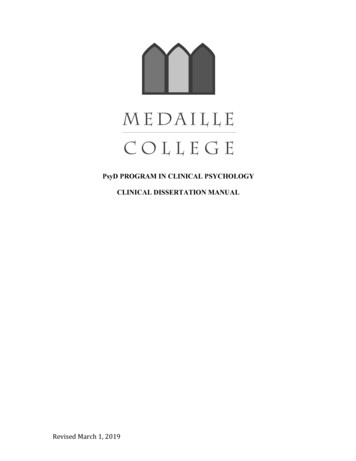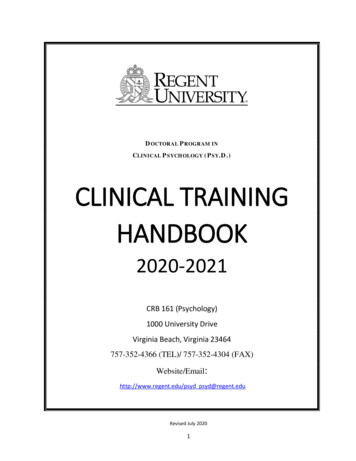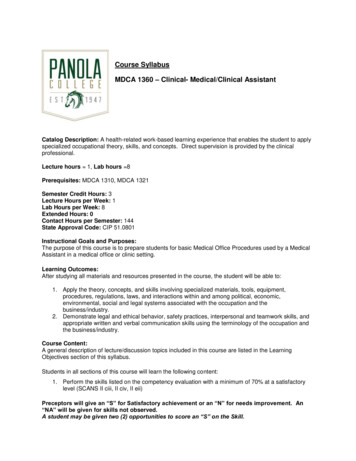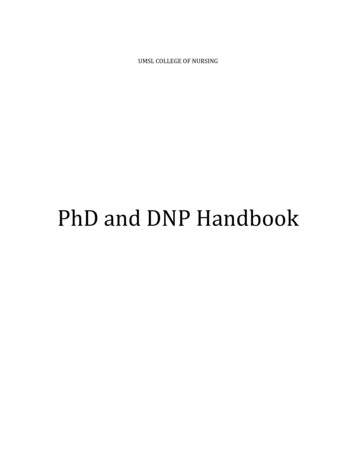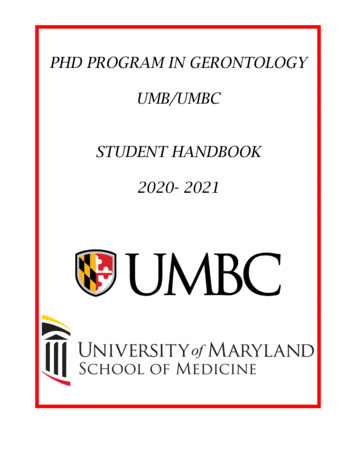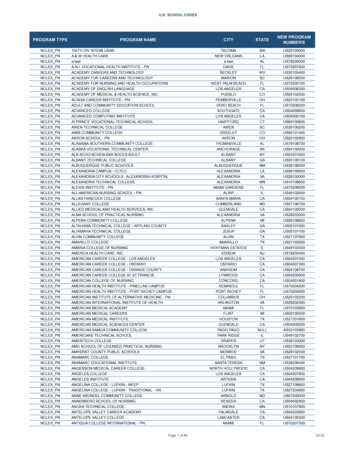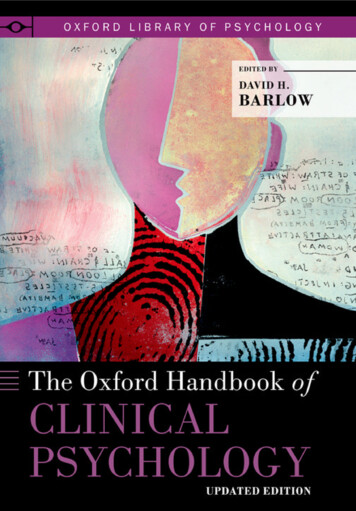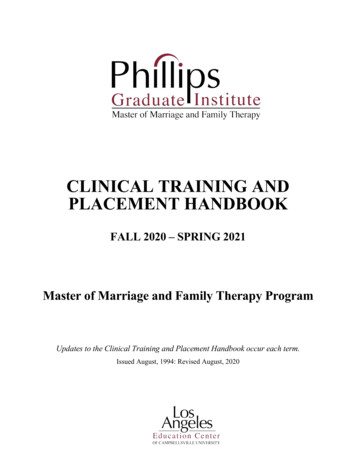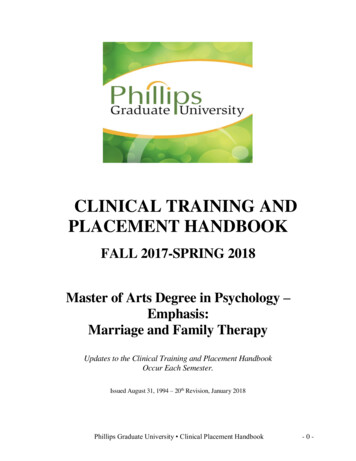
Transcription
CLINICAL HANDBOOKPHD PROGRAM IN CLINICAL PSYCHOLOGYDEPARTMENT OF PSYCHOLOGYTHE GEORGE WASHINGTON UNIVERSITYFALL 2020
Table of ContentsProgram Philosophy, Goals, and Structure . 4Coursework Requirements. 7Non-Coursework Requirements . 11Tracking Progress . 23Program Continuance and Termination Policy .28Other Important Topics. 29University and College Policies. 29Financial Assistance . 29Full-time Certification . 29Leave of Absence . 30Libraries . 30Study and Research Space . 30Student Health and Wellness Services . 30Student Participation in Clinical Program Faculty Meetings . 31Student Participation in Program Workgroups . 31Consortium System . 32Promoting Equal Educational Opportunity and Equity . 32Information for International Students . 35Appendices . 38Appendix A: Summaries of Requirements and Deadlines . 39Appendix B: Clinical Competency Requirements . 46Appendix C: Meltzer Activities . 48Appendix D: APPIC Definitions for Classifying Hours . 49
Welcome to the Department of Psychological and Brain Sciences at the George WashingtonUniversity. This HANDBOOK for the Clinical Program and the VADE MECUM for the departmentand the GRADUATE STUDENT HANDBOOK define your program requirements and regulations.Please save this Handbook and the Vade Mecum as your personal record of the programrequirements for your year of entry. If you have any questions or concerns, please see youradvisor, the Director of Clinical Training (DCT), or the Director of the Graduate StudiesCommittee of the Psychological and Brain Sciences Department.Copies of the Clinical Handbook for the prior 4 years can also be found on the ClinicalProgram’s Student Cloud drive. In addition, other program forms (e.g., Comprehensivesevaluation forms; dissertation forms) and resources can be found on this drive.
Program Philosophy, Goals, and StructureProgram Philosophy and GoalsOur program adheres to a scientist-practitioner model of training. We subscribe to the basic principles,articulated in the report of the 1990 Gainesville National Conference on Scientist-PractitionerEducation and Training for the Professional Practice of Psychology, that a “. scientist-practitionermodel of education and training in psychology is an integrative approach to science and practicewherein each must continually inform the other.” (Belar & Perry, 1992, p. 72). Our implementation ofthe scientist-practitioner model has four general goals:1. To educate psychologists in the role of applied scientist.We believe that students in our program need to understand the value of using scientificmethods to tackle applied problems. For some, this will involve learning how to conductresearch on factors and mechanisms that increase risk for the development of psychopathologyor for delays in social or emotional development. For others, it will involve learning how to testnew intervention methods for preventing or treating clinical conditions in community settings.Given the substantive focus of our program, we train our students in how to study these issuesin populations that are diverse in terms of culture, language, economic condition, andcommunity setting. We see this as a two-way street, such that our students should also be ableto understand how to use experiences in applied work to formulate questions and hypothesesthat can be tested using scientific methods, and to identify areas whose illumination canadvance the quality and impact of the services we provide to our community of clients.2. To educate psychologists in the role of scientifically-oriented clinician and interventionist.We believe that our students need to understand how to apply both the logic and the substantivefindings of science to their roles as intervention specialists. These include more traditional rolesproviding assessment and treatment services to individuals, couples, and families, but alsoencompass a growing range of activities such as conducting group-based preventiveintervention programs or designing, implementing, and managing such programs in communitysettings. We emphasize the importance of scientific findings concerning etiologic mechanismsthat operate over the course of the lifespan as a basis for understanding what needs to beassessed and what needs to be targeted in intervention. We emphasize the use of empiricallysupported assessment and intervention strategies as a foundation for applied work. However,we also challenge our students to develop ways of understanding the unique meaning and lifenarrative that each client, couple, or family brings to the table. We urge them to struggle withhow to adapt and apply empirically-based approaches to fit the unique identity andcircumstance of each client, within a relationship that supports and validates the dignity of eachperson, and with particular attention to how individual meanings are embedded in culture,economic circumstance, gendering, and community. Reaching back to early personality theory,we work from the observation that “.every person is like all other persons, like some otherpersons, and like no other persons” (Kluckhohn & Murray, 1953). Finally, we work to reinforceour students’ use of the methods of science as a means of assessing and understanding thecomplex factors shaping the life course and distress of each client, using hypothesis generationand testing as a strategy in each case to inform assessment and intervention choices.4
3. To educate psychologists to approach applied problems from a perspective that attends tolifespan developmental processes within a multilevel social ecological framework.We approach training from the perspectives of lifespan development and social ecology. Weemphasize issues of developmental continuity and change across childhood, adolescence, andadulthood, particularly as these inform understanding of how disorders emerge, are maintained,and resolve over various parts of the life course. Students take a two-course sequence indevelopmental psychopathology across the lifespan. In addition, we emphasize understandingsuch development within a social ecology framework, including attention to the developmentof risk or protective processes at multiple levels of social organization, including the family,neighborhood, community, and culture. As a result, students will take a two-course sequence incommunity psychology and a course in cultural diversity and mental health. We see theseframeworks as particularly important for preventive intervention, although they also have clearrelevance for other professional roles in which our students are likely to engage, includinghealth promotion or treatment of emotional and behavioral disorders.4. To educate psychologists in the skills and knowledge necessary to support professionalcareers in health promotion and the prevention and treatment of physical, emotional, andbehavioral disorders in diverse urban communities.Our training is centered on public health issues involving the promotion of health and theprevention and treatment of physical, behavioral, and emotional disorders within diverse urbancommunities. This focus is also congruent with the applied research programs of the coreclinical faculty, which emphasize the study of malleable risk and protective mechanisms inchildhood, adolescence, and adulthood, developing and evaluating community-basedintervention trials of programs such as preventive interventions in African Americanadolescents at risk for suicide, and developing and evaluating programs for adults at risk fordepression in the face of economic adversity, or group interventions to reduce risk ofdepression in low-income women during and after pregnancy.In summary, our program is guided by a commitment to train students as: (1) applied scientists, (2)interventionists who use the methods and substantive findings of science to inform assessment,prevention, and treatment activities, (3) professionals who consider applied problems from a lifespandevelopmental perspective and from multiple levels within human social ecology, and (4) clinicalpsychologists with specialized knowledge and skills necessary for developing and implementingpromotion, prevention, and treatment programs for clients who are economically, linguistically, andculturally diverse.Program AccreditationThis program is accredited by the American Psychological Association. Information on ouraccreditation status, and on the accreditation process, may be obtained from the Office of ProgramConsultation and Accreditation, American Psychological Association, 750 First Street NE,Washington, DC, 2002-4242. The Office can be reached by telephone at 202-336-5979, or by email toapaaccred@apa.org. Information about the Office can be found on the web athttp://www.apa.org/ed/accreditation/.5
Department and Clinical ProgramThe Department of Psychology is composed of approximately 75 graduate students, 25 full-timefaculty members), and several part-time instructors and clinical faculty.The full-time clinical faculty members are Professors S. Calabrese, J. Ganiban, C. Gee, G. Howe(Director of Graduate Studies), S. Lambert (Associate Director of Clinical Training; ADCT), H.N. Le(Director of Clinical Training; DCT), S. Molock, C. Rohrbeck, and M.C. Zea. R. Peterson is ProfessorEmeritus. The Director of the Meltzer Center is Dr. R. Broudy. In addition, several part-time teachingclinical faculty and faculty with clinical appointments are involved with teaching, placement andsupervision of students in clinical practica.Many of the faculty members in the other Psychological and Brain Sciences Department programshave research interests which blend with clinical faculty and student interests. Faculty in the two othergraduate programs in the department include:Applied Social: Professors P. Barratt, L. Bowleg, T. Dodge, P. Moore, P. Poppen, C. Sigelman, M.Stock, and E. Yeung.Cognitive Neuroscience: Professors S. Dopkins, D. Kravitz, S. Mitroff, J. Philbeck, G. Rosenblau, L.Rothblat, S. Shomstein (Department Chair), and M.H. Sohn.6
Coursework RequirementsProgram of StudiesStudents are encouraged to develop personalized and differentiated programs of study. If coursesoutside the program or department help fulfill your career goals, you are encouraged to pursue them.You are urged to plan your schedule carefully in consultation with your research advisor and the DCT.Appendix A includes two worksheets for tracking your progress. The first summarizes courseworkrequirements, while the second summarizes all other program requirements. You are encouraged to useDegreeMAP in GWEB to check into your progress in the program.Course Requirements*** Keep copies of all syllabi. You may be required to produce syllabi for licensure.Graduate students in clinical psychology must complete 72 credit hours of coursework for the doctoraldegree. This includes three types of courses: Departmental core courses (also called area requirementcourses), Clinical Program core courses, and elective courses. In some cases specific courses arerequired; in other cases one of several courses can satisfy a requirement. Possible substitutions must bereviewed by a department faculty member with expertise in the relevant area, and approved by theDirector of Clinical Training.The requirements for the Doctor of Philosophy in the Field of Clinical Psychology can also be ology2/#requirementstextDepartmental Core Courses. The following courses meet the area requirements for all graduatestudents in the department, as well as meeting APA breadth requirements for clinical graduatestudents. APA breadth requirements refer to foundational courses in the biological, cognitive, social,developmental, and individual basis of behavior (21 credit hrs.). For Departmental Core courses,students must earn a grade of B or higher in order for the course to count towards doctoral candidacy.Departmental Core CoursesDNSC 6274Statistical Modeling and AnalysisDNSC 6275Advanced Statistical Modeling and AnalysisDNSC 6276Exploratory and Multivariate Data AnalysisPSYC 8202Psychological Research Methods and ProceduresAPA Breadth Requirements CoursesPSYC 8210Developmental Theories and Issues (Human development and individualdifferences)PSYC 8250Seminar in Cognitive Neuroscience (Biological and cognitive bases)PSYC 8253Social Cognition (Social option 1)PSYC 8255Attitudes and Attitudes Change (Social option 2)7
Clinical Core courses. The following courses meet requirements for the Clinical Program (33 credithours). Students are also required to complete several 0-credit (pass/fail) courses. Students must obtaina grade of B or higher for the Clinical Core course to count towards doctoral candidacy.PSYC 8207PSYC 8208PSYC 8211PSYC 8212PSYC 8218PSYC 8220PSYC 8236PSYC 8237PSYC 8238PSYC 8239PSYC 8240Psychological Assessment IPsychological Assessment IICommunity Psychology ICommunity Psychology IIEvidence-based InterventionsEthics and Professional IssuesEthnic and Racial Diversity in PsychologyThe Practice of General Psychology IThe Practice of General Psychology IILifespan Developmental Psychopathology ILifespan Developmental Psychopathology IIZero credit coursesPSYC 8280PSYC 8283PSYC 8284PSYC 8285PSYC 8286Theories and Practice of Clinical SupervisionFirst-year Seminar I: Motivational InterviewingFirst-year Seminar II: Introduction to Therapy*History & Systems of PsychologyClinical Psychology Externship (repeat F & S for 2 academic years)Electives1At least 3 credits, up to 6 credits outside the Clinical ProgramPSYC 89991Dissertation Research (minimum of 6 credits, up to 12 credits)*This course is designed to be an 8-week course taken during the Fall semester of the first year. Werequire that you complete 8285 during the Fall semester of the 1st year. Dr. Rohrbeckwill contact youwith details about the course.1Electives and Dissertation Credits. Once the Department and Clinical Core courses are completed,students are required to complete an additional 15 hours of coursework to meet the requirement of 72total hours. Of the 15 hours, a student must enroll in at least 6 credit hours of Dissertation Research(PSYC 8999). Of the remaining 9 credits, a minimum of 3 credits should be an elective. The other 6credits can either be an elective (inside or outside of the Psychology department) or as dissertationresearch (PSYCH 8999).Guidelines on course substitution. Course substitution is possible, although limited.For Departmental or Clinical Core courses, other than those meeting APA area breadth requirements:It is unusual to accept substitution of a graduate course from another department or Consortiumuniversity. To request such substitutions, students need to provide documentation that the outsidecourse covers the same material as that of the relevant Core course. Such a request would be submittedto and reviewed by the current department instructor of that course, and by the DCT.8
Transfer of credit. The program allows up to 24 hours of transfer credit for students with a Master’sDegree in Psychology. In order for credit to transfer, an appropriate department course requirementmust be waived. In some cases, non-comparable courses can be used as electives in the ClinicalProgram. Students with some graduate courses, but who do not have a graduate degree, can transfer upto 12 hours credit if appropriate courses can be waived.Waiving course requirements. If you have taken an appropriate graduate level course at anotherinstitution, you may petition to waive out of that program course requirement. Students petitioning towaive out of the course should submit a written request to the DCT with a copy of the course syllabusand unofficial transcript documenting the grade received. The faculty instructor of the currentequivalent course will review the syllabus and provide a written recommendation to the DCT regardingapproval of the course substitution. If approved, the DCT will submit a request for credit transfer to theGraduate School. If transfer credit is not received for the course, another course must be taken to coverthe hours of the waived course. An original transcript from the schools where you took the coursesmust accompany the application submitted to the Graduate School for credit transfer.Auditing: If a student wants to audit an elective course, the student must sign up for the course usingan RTF, available on the registrar's website (https://registrar.gwu.edu/forms), where the student canrequest auditing as the grade mode. You will need permission from the instructor in the form of asignature on that RTF to audit. Please note that as the course does not count towards the credit requiredfor your degree and will not be covered by an award from the University; thus, students will beresponsible for the tuition for the course.Elective courses can include any graduate course in the Psychology Department, as well as anyuniversity or consortium graduate course in a topic area relevant to the student’s interests. ALLelective or breadth courses from other departments or consortium schools must be approved bythe advisor and the DCT before taking the course. Please obtain advisor approval first and thensend an email request for approval to the DCT with the advisor cc’ed. Syllabi (if available) forany courses outside of the department should be provided.Examples of electives in the Psychological and Brain Sciences Department: 8225 Behavioral Approaches - Child 8254 Social Influence 8256 Intro to Survey Research 8257 Psychology of Risk Behavior 8259 Psychology of Individual/Group Decision-Making 8287 Current Topics in Clinical Psychology (e.g., 8287 Behavioral Aspects of HIV/AIDS) 8279 Special Topics in Health Psychology (e.g., Discrimination and Health) 8277 Health Psychology 8289 Seminar: Current Topics in Experimental PsychologyExamples of electives outside of the Psychological and Brain Sciences Department (must be approvedby the advisor and DCT): PSYD 8250 Neuropsychological Asses
intervention programs or designing, implementing, and managing such programs in community settings. We emphasize the importance of scientific findings concerning etiologic mechanisms that operate over the course of the lifespan as a basis for understanding what needs to b
